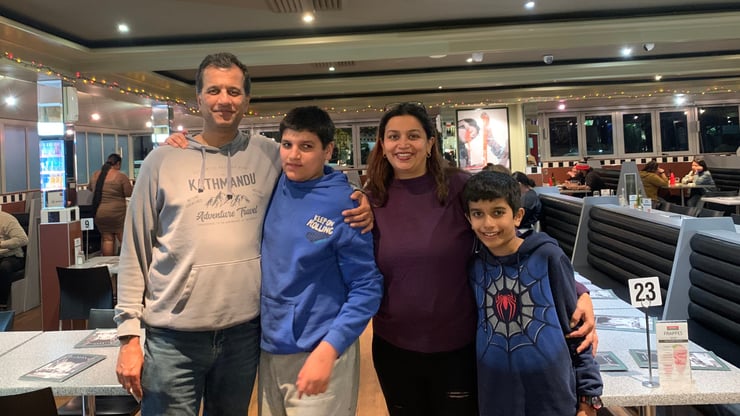Angel Without Wings: The Journey Of A Special Boy

When you imagine angels, thoughts of nimbleness and happiness come to mind. But what if their wings were clipped? Wouldn’t you then think of pain, suffering, and helplessness?
This is what happens when a child is diagnosed with Angelman Syndrome (AS), a rare genetic disorder present from birth. Sadly, there is currently no cure for it anywhere in the world.
International Angelman Day (IAD) is an annual event held each year on February 15.
What is Angelman Syndrome (AS)?
AS is a very rare neurogenetic disorder that occurs in approximately one in 15,000 births. It is caused by the loss of function of a gene (UBE3A) on the 15th chromosome inherited from the mother. However, scientific research confirms that this genetic flaw is purely accidental and not influenced by any voluntary or involuntary contribution from the mother. AS is often misdiagnosed as autism, cerebral palsy, or schizophrenia.
However, two key factors provide hope:
Unlike many other genetic disorders, scientists have identified its precise cause— the non-functioning UBE3A gene.
AS does not hinder neuronal development but only impairs neuronal function. This suggests that if UBE3A can be reactivated, normal brain function could be restored.
International Angelman Day (IAD)
It's an annual event held each year on February 15. It is observed by over 55 international organisations around the world, who all support people with AS, their families and caregivers.
It is celebrated on the 15 February in recognition of the 15th chromosome being affected in the case of Angelman syndrome, and February as the last day of the month is International Rare Disease Day
Common symptoms of AS
Some developmental challenges associated with AS include:
Crossed eyes and drooling
Delayed or absent crawling as a baby
Minimal or no speech
Lack of muscle coordination
Difficulty with balance and walking
Intellectual disability
Sleeping difficulties (due to low melatonin production)
Frequent smiling and laughter with an overall happy demeanor
Love for water play
Seizures and facial abnormalities in severe cases
Despite these symptoms, individuals with AS generally have a joyful and excitable nature.
Discovery of AS
The syndrome is named after Dr. Harry Angelman, a British physician who first described it in a 1965 research paper. Initially, AS was referred to as “Happy Puppet Syndrome” due to the unique movements and cheerful disposition of affected children. Later research revealed the condition to be more common than previously thought.
Life expectancy
Individuals with AS have a normal life expectancy but require lifelong care due to their dependency. They are also at high risk of accidents due to difficulties with walking and balance.
Research indicates that some symptoms may improve with age. Sleep disturbances and seizures may become less frequent, though mobility challenges can lead to obesity in adolescence.
Life as parents of a child with Angelman Syndrome
Our first child, Arnav, has AS. On September 24, 2025, he will turn 17 years old. My husband and I have journeyed from being completely unaware of AS to becoming well-versed in managing it. It has been a long and painful road, both for us and for Arnav.
Arnav took his first steps with support when he was over two years old. My husband and I have longed to hear him say "Mumma" or "Daddy," but we now realise that day may never come. He slept through the night for the first time at age 7.5— about six months after starting melatonin tablets.
When a baby is born, it is a moment of pure joy for the entire family. This joy is even greater when it is the firstborn. However, as time passes and you realise your child is not meeting developmental milestones, the worry sets in.
After countless doctor visits over two and a half years, we finally received the devastating diagnosis: our child had a rare genetic condition. Worse yet, there was no cure.
I used to cry regularly, but with the support of my husband, my parents—especially my late mother—and my own realization that tears would not change our reality, I learned to confront the situation head-on. Though difficult and frustrating days still arise, we remind ourselves that they, too, will pass.
Every night, I tuck Arnav into bed, and he gives me his infectious smile, uttering only "mumumumum." Many mornings, he wakes up early, making noises, and we struggle daily to get him ready for the special school he attends.
He is still not toilet-trained and must wear nappies 24/7, leading to inevitable accidents. Due to his flat feet, he cannot walk long distances and requires a wheelchair.
When he leaves for school, I always pray he won’t fall or hurt himself. Sometimes, my prayers go unanswered, and we must rush to pick him up from school or take him to the emergency room.
Only in the last few years has he started eating with a spoon—provided the food is mixed and served in one bowl. His excitability over small things can sometimes lead to frustration.
If his food bowl is taken without his permission or if we misinterpret his needs, he may respond with limited hand movements or mild aggression. Since he cannot speak, his only ways of expressing discomfort or illness are through crying or agitation.
God has blessed us with another son, Sameer, who is now 10 years old. He is the most wonderful and caring brother to Arnav. Despite the challenges, we have learned that a positive attitude is essential. In fact, Arnav’s journey has taught us to appreciate all the other blessings in our lives.
We know that Arnav loves us deeply, just as we love him. He may never be able to say those magical words, but he has his own special ways of expressing his love.
Through his radiant smile, and the way he reaches out to hold our hands, he reminds us every day of the unspoken bond we share.
He will always be our angel.





